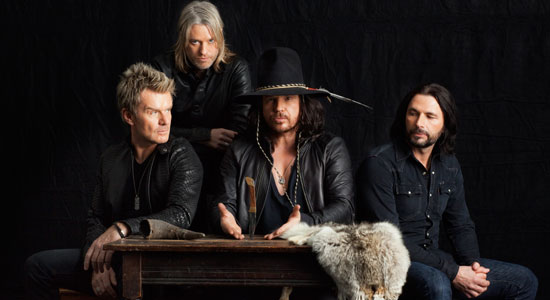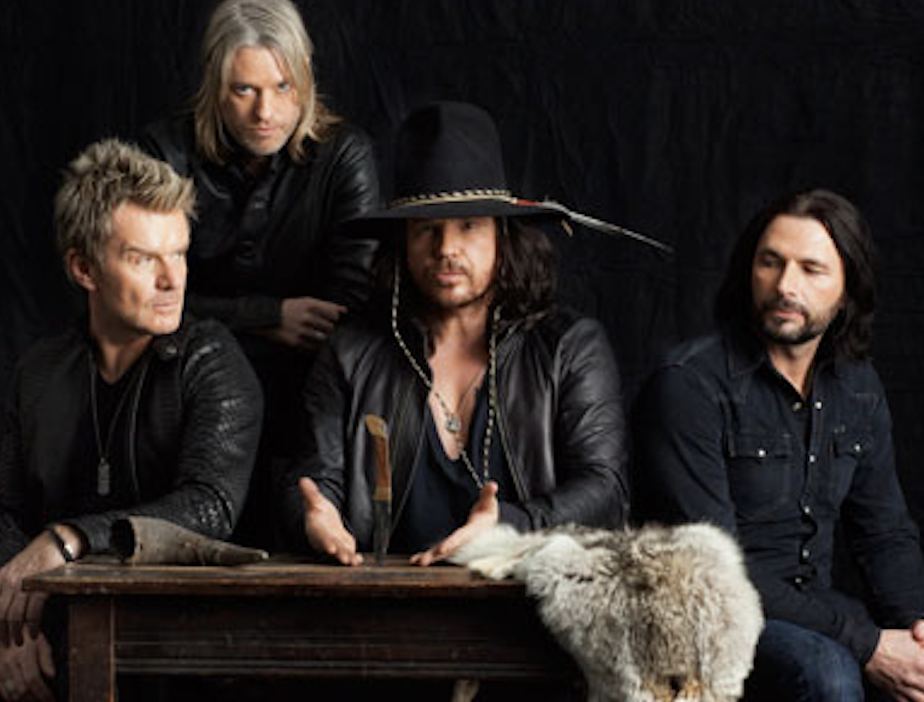
Ian Astbury is so much funnier than we imagined. Rather than be elusive where his past is concerned (goth progenitors Southern Death Cult) and the scene that spawned him, Astbury is chatty and playful. Rather than present the Cult, his mighty metal-crunching band with guitarist Billy Duffy, as rock gods, he places them at the center of a continuum, from Cream to the Clash. He talks about playing Puerto Rican party nights at Danceteria, getting turned on to T.Rex on Radio Luxembourg and hanging out with Rick Rubin before Def Jam hit hard. Mostly, though, Astbury takes down those who make themselves authoritarian without merit—music journalists, politicians—in a fashion similar to his highly personal lyrical outlook on Choice Of Weapon (Cooking Vinyl), the newest and best Cult album since 1994’s The Cult. Astbury will be guest editing magnetmagazine.com all week.
MAGNET: Is there anything left of the kid who started Southern Death Cult in you?
Astbury: Very much so. [Laughs] The drive, the striving to connect, the integrity, for sure. What do you know about the Southern Death Cult anyway? Honestly?
I lived in London during the year you guys started, hung at the Batcave in Leicester Square and had the pleasure of seeing you guys.
OK, so you’re not a kid just coming up with no idea of what was going on back then. Great. So many people who try to have a perspective now simply can’t have one because they weren’t there. I appreciate that you were there and got it. People thought of that Batcave as an all-goth music scene, but you could go in there on any given night and members of the Clash would be there, or Jimmy Page would stop in. It was a real hangout for the lot of us. A lot of us came up there.
It was a good time for sure. David Sylvian was my neighbor when he was still wearing makeup. Is the U.K. still part of your life? Have you given up on England? I know you were born in Canada, but it was England where you made your bones.
Not really. I mean there are periods. I keep an apartment there, but I continuously found myself heading east after the Cult made it—like to New York. Growing up, I was only 14 miles from the U.S. border, so everything cultural that came through America from the ages of 11 to 16 affected me. It was same things that affected kids in New York City: radio stations, fashions, Don Kirshner’s Rock Concert, The Midnight Special. No matter where I lived, I always gravitate toward outside things and other outsiders, most so in London.
Have you been around for the Occupy things? I get a sense throughout several parts of the new album that there is a brand of insurgence you’re espousing that has awful lot to do with the movement. Weapon is ripe with the joy of anarchism.
Well, I didn’t just arrive at my conclusions or observations because of what was going on with the Occupy movement. Some of the content of the songs can be reflected in the symbols of Occupy. There are aspects of the culture that now have a place, have congregated themselves in the Occupy moment. There is, though, that criticism that Occupy has no real agenda. But part of their response is that everything is their agenda. It’s not just about railing against capitalism. People are stepping forward and sharing their despondence. People are waking up. That’s what Weapon reflects. I grew up in a family of workers. I lived in factory towns like Glasgow. I have seen a world of people pushed aside before the notion of profit margins. Using that as a backdrop, some of our new songs like “Life>Death” and “This Night In The City Forever” make even more sense. Then again, the latter was written the evening that Obama won the election and we were all out there feeling the energy of the city, the anticipation of the possible. I remember people running down the street. So animated, so completely mental, such connection. So many possibilities. We wanted that night to never stop.
I get that a song like “Night In The City” can speak to the power of Occupy as well as the power of Obama. Would you agree then that parts of the album face the possibility of the party having ended?
Every great party ends, and what do you have left? Introspection. There’s spirituality, too, at work: “If I pray, I’ll get the girl.” “If I pray, my bank account will rise.” “If I pray, everything will be OK.” That’s fine to think about, but the hard work begins after the victory celebrations.
To say nothing of the hangover. You guys have split apart, come together, split apart, reconfigured. You can look at 1995 and say maybe that was the one time you guys broke up, but was there ever true fissure or disconnect between you and Billy? Ever a moment where you believe you wouldn’t be the Cult again?
I don’t think so, no. The Cult has always been in life since its inception, and I suspect it always will be. It’s the collaboration between Billy and I, the connection. I’ve been lucky in that I can pick and choose the best of what he has to offer for the Cult’s own. He has that vision as well, I trust. There are moments where it’s been more in the back or toward the recesses, of course, but in my mind I am always the Cult. It’s as if it’s been thrust upon me since Southern Death Cult. They were looking for a singer and liked the way I looked. I was sort of looking for a band and liked the way they looked. [Laughs] That was it. It was, “Yeah, sure, why not?” and from there I never looked back. It wasn’t a career choice. I hadn’t really considered such before that. It just happened. It’s strange the choices you make.
Do you think that you’ve made the most of each Cult opportunity—especially, say, in the last 10 years and (2007’s) Born Into This?
Born Into This came out fully realized. Amazing scope that album has. We had the framework. Great songs. Threw it up, batted it out, but the skies didn’t open. It was a contractual obligation. The pressure to have perfect weather conditions every time is often hard. Sometimes it rains during the big game. This new album, we took our time and wrote and recorded it when we were ready, with no consideration other than just creating what was in our heads, in our focus, at that moment. You also don’t want to be too focused. You want to make room for all possibilities.
For all your personal and lyrical complexities, you’ve chosen a very direct form of music in which to explain yourself.
There are albums of ours, like Electric, where there is a cinematic scope to the melodies. But I totally get what you’re driving at, and even agree. We made a creative choice. I mean, I was there in 1977, amongst the Never Mind The Bollocks, where the patriarchs got torn down, the classic-rock gods. But there were some whose music was untouchable—the heaviness of the Doors or Iggy Pop, for example. Even Led Zeppelin and Black Sabbath were OK. We were going against the grain of that grain, the punk grain, and by the time we hit 1985 and Love, we didn’t care about the snide indie public discourse of papers like the NME, who told you what you had to like. We wanted to rail against all that; not to be contradictory to them, but to be contradictory to everything. We hated that sort of elitism, that posturing. What better than big rock to show that level of anti-elitism, that fight against art-for-art’s sake.
I wouldn’t assume what lyrics mean what, but there’s a moment on “Amnesia” where I can’t tell who you’re taking down: politicos, spiritualists or fellow rock bands for not taking risks. Who you talking ’bout, Ian?
I’m against any self-imposed gatekeepers of the culture, anyone who believes they have some sort of authority that they’re not qualified to have. The internet does this, lends credibility to anyone without question. This might seem like an old-fashioned complaint, but what happened to questioning authority? Where I come from—punk rock—that was the point. I’m surprised that whole generations in our wake have turned the other cheek. That same sort of pious authoritarian quality is what ruled the ’80s—like the NME, where they felt as if they were the true and only source for cultural education. But with that comes responsibility, and the question then becomes, “Do they have the goods and the history and the knowledge to make it count?” Never set yourself up as an authority figure if you can’t back yourself up.
—A.D. Amorosi







One reply on “A Conversation With The Cult’s Ian Astbury”
[…] or his disdain for authority. We share that in common. In recent interviews, like the one with Magnet Magazine, he shares his concern that reviewers and writers in a position of seeming authority do not state […]